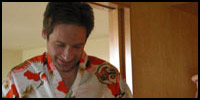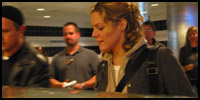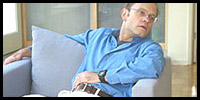
 |
Full Frontal (2002) Directed by Steven Soderbergh Cast: Catherine Keener, David Hyde Pierce, Blair Underwood, Julia Roberts, Mary McCormack, Enrico Colantoni, Nicky Katt, David Duchovny, Erika Alexander, Tracy Vilar, Brad Pitt, David Fincher, Brad Rowe, January Jones, Jerry Weintraub, Sandra Oh, Terence Stamp 2002 – 101 minutes Rated: Reviewed by Dustin Putman, August 4, 2002.  Because director Steven Soderbergh has had three consecutive blockbuster successes (2000's "Erin Brockovich," 2000's "Traffic," 2001's "Ocean's Eleven"), it might be easy to forget that he began his career with a number of independent films—1989's daring "sex, lies, and videotape" and 1997's purely experimental "Schizopolis." In a bid to return to his roots, he has put together a large cast of big-name stars and lesser-known character actors for "Full Frontal," a $2-million oddity filmed in 18 days and mostly shot on grainy digital video. In making the movie, Soderbergh's memo to his cast was simple: they had to provide their own transportation; they would not be furnished with trailers or catering services; they were responsible for their own wardrobe and makeup; and they were going to have fun, whether they wanted to or not.
Because director Steven Soderbergh has had three consecutive blockbuster successes (2000's "Erin Brockovich," 2000's "Traffic," 2001's "Ocean's Eleven"), it might be easy to forget that he began his career with a number of independent films—1989's daring "sex, lies, and videotape" and 1997's purely experimental "Schizopolis." In a bid to return to his roots, he has put together a large cast of big-name stars and lesser-known character actors for "Full Frontal," a $2-million oddity filmed in 18 days and mostly shot on grainy digital video. In making the movie, Soderbergh's memo to his cast was simple: they had to provide their own transportation; they would not be furnished with trailers or catering services; they were responsible for their own wardrobe and makeup; and they were going to have fun, whether they wanted to or not.
 "Full Frontal" is an unrestrained, at times improvised, 24-hour expose on a group of interconnected people living in Hollywood who will converge in the evening for the 40th-birthday bash for movie producer Gus (David Duchovny). Lee (Catherine Keener) is a harried personnel executive on the verge of a nervous breakdown who, at the start, leaves a breakup note to her writer husband, Carl (David Hyde Pierce). Before Carl has a chance to find it, he receives another crushing blow when he is fired from his job. Lee's sister, Linda (Mary McCormack), is a masseuse planning to travel to Tucson the following day to meet a 22-year-old man off the Internet. What she doesn't know is this "22-year-old" is actually a 40ish playwright (Enrico Colantoni) living in the same city as she. He is currently gearing up for a stage play about Adolf Hitler (Nicky Katt) called "The Sound and the Fuhrer." Finally, shot on clearly-defined, vibrantly-colored 35mm for a specific reason that will soon reveal itself, Catherine (Julia Robert) is a journalist interviewing black movie star Nicholas (Blair Underwood) while on a plane trip back to Los Angeles. As they talk the hours away, they begin to fall in love with each other, despite initial hesitation.
"Full Frontal" is an unrestrained, at times improvised, 24-hour expose on a group of interconnected people living in Hollywood who will converge in the evening for the 40th-birthday bash for movie producer Gus (David Duchovny). Lee (Catherine Keener) is a harried personnel executive on the verge of a nervous breakdown who, at the start, leaves a breakup note to her writer husband, Carl (David Hyde Pierce). Before Carl has a chance to find it, he receives another crushing blow when he is fired from his job. Lee's sister, Linda (Mary McCormack), is a masseuse planning to travel to Tucson the following day to meet a 22-year-old man off the Internet. What she doesn't know is this "22-year-old" is actually a 40ish playwright (Enrico Colantoni) living in the same city as she. He is currently gearing up for a stage play about Adolf Hitler (Nicky Katt) called "The Sound and the Fuhrer." Finally, shot on clearly-defined, vibrantly-colored 35mm for a specific reason that will soon reveal itself, Catherine (Julia Robert) is a journalist interviewing black movie star Nicholas (Blair Underwood) while on a plane trip back to Los Angeles. As they talk the hours away, they begin to fall in love with each other, despite initial hesitation.
 Laid-back, abstrusely plotted, and relying heavily on voice-over narration that oftentimes has little to do with the scene at hand, "Full Frontal" is more of a peculiar exercise than a conventional motion picture. That is not to say it doesn't succeed at its goals, because it does. Directed by Steven Soderbergh and written by Coleman Hough, "Full Frontal" is a character-based "slice-of-life" rather than a story-rich enterprise. The only catch is, the film goes to great pains to show that life is but a big movie in and of itself. There is a self-mocking tone to many of the scenes, but every time Soderbergh threatens to stop taking his characters seriously, he puts a deeply-felt emotional spin on the material and brings his subjects back to planet Earth.
Laid-back, abstrusely plotted, and relying heavily on voice-over narration that oftentimes has little to do with the scene at hand, "Full Frontal" is more of a peculiar exercise than a conventional motion picture. That is not to say it doesn't succeed at its goals, because it does. Directed by Steven Soderbergh and written by Coleman Hough, "Full Frontal" is a character-based "slice-of-life" rather than a story-rich enterprise. The only catch is, the film goes to great pains to show that life is but a big movie in and of itself. There is a self-mocking tone to many of the scenes, but every time Soderbergh threatens to stop taking his characters seriously, he puts a deeply-felt emotional spin on the material and brings his subjects back to planet Earth.
 For the most part, the cast does solid work, made all the more impressive because they were allowed, at least to some degree, to create their own characters. Catherine Keener (2002's "Lovely & Amazing") gets to strengthen her résumé once more with the most dramatically sound and intimate performance in the bunch. Keener's Lee, as the viewer gradually finds out, is on her last leg. Unhappy at home, unhappy in her marriage, unhappy at work, and with childhood-based wounds that have never been healed, she is getting ready to internally explode at any minute. Keener is acidly funny (as when she tests out her employees with increasingly outlandish demands) and alternately heartbreaking, particularly in a late scene when she overhears her husband talking to an acquaintance about his unremitted love for her.
For the most part, the cast does solid work, made all the more impressive because they were allowed, at least to some degree, to create their own characters. Catherine Keener (2002's "Lovely & Amazing") gets to strengthen her résumé once more with the most dramatically sound and intimate performance in the bunch. Keener's Lee, as the viewer gradually finds out, is on her last leg. Unhappy at home, unhappy in her marriage, unhappy at work, and with childhood-based wounds that have never been healed, she is getting ready to internally explode at any minute. Keener is acidly funny (as when she tests out her employees with increasingly outlandish demands) and alternately heartbreaking, particularly in a late scene when she overhears her husband talking to an acquaintance about his unremitted love for her.
 As Lee's husband, Carl, David Hyde Pierce (2000's "Isn't She Great") sheds his usual comic persona from TV's "Frasier" to effectively play a man whose day couldn't get any worse, unless he were to stumble upon the note Lee left for him. Meanwhile, Blair Underwood (2000's "Rules of Engagement") and Julia Roberts (2001's "Ocean's Eleven") light up the screen together in unpredictable dual roles, both as the characters they are playing in a movie called "Rendezvous" and as actors. Roberts displays a spontaneity not as often seen in her big-budget projects, and offers up some very funny line deliveries. After taking a few bites out of a tuna sandwich her assistant has given her, she remarks how bitter it is. "It tastes like my algebra teacher on bread!" she exclaims.
As Lee's husband, Carl, David Hyde Pierce (2000's "Isn't She Great") sheds his usual comic persona from TV's "Frasier" to effectively play a man whose day couldn't get any worse, unless he were to stumble upon the note Lee left for him. Meanwhile, Blair Underwood (2000's "Rules of Engagement") and Julia Roberts (2001's "Ocean's Eleven") light up the screen together in unpredictable dual roles, both as the characters they are playing in a movie called "Rendezvous" and as actors. Roberts displays a spontaneity not as often seen in her big-budget projects, and offers up some very funny line deliveries. After taking a few bites out of a tuna sandwich her assistant has given her, she remarks how bitter it is. "It tastes like my algebra teacher on bread!" she exclaims.
 The picture quality for much of "Full Frontal" is purposefully shoddy. Grainy, blurred, and underexposed, even my personal digital camcorder presents a sharper image. In style and narrative, the film could have easily been a self-involved disaster reminding one of an amateur student project. In the hands of director Steven Soderbergh, however, it is apparent for almost the entire 101-minute running time that he is in well-focused control. While not all of his aspirations pay off (the statement he wants to make about film versus reality is not a new one, nor is it developed enough to fully gratify), "Full Frontal" penetratingly draws us in to this passing snapshot of just a few of the many unsatisfying lives in Tinseltown.
The picture quality for much of "Full Frontal" is purposefully shoddy. Grainy, blurred, and underexposed, even my personal digital camcorder presents a sharper image. In style and narrative, the film could have easily been a self-involved disaster reminding one of an amateur student project. In the hands of director Steven Soderbergh, however, it is apparent for almost the entire 101-minute running time that he is in well-focused control. While not all of his aspirations pay off (the statement he wants to make about film versus reality is not a new one, nor is it developed enough to fully gratify), "Full Frontal" penetratingly draws us in to this passing snapshot of just a few of the many unsatisfying lives in Tinseltown.
©2002 by Dustin Putman |
 |













